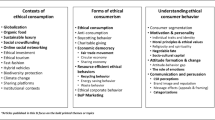Abstract
This paper draws from the work of sixteenth century theologian, philosopher, and ethicist Domingo de Soto and considers his virtue-based approach to the ethical evaluation of commerce within an Aristotelian–Thomistic framework for the articulation of business and the common good. Particular attention is given to the fundamental emphasis placed by Soto in distinguishing between commerce as an activity and the specific conduct of persons engaging in commercial activity. The distinction between the material and the formal parts of the common good is then employed to shed light on the way Soto articulates commercial practices, virtuous character, and the common good. It is concluded that Soto’s major contribution for business ethics is clarifying that the key element for the ethical evaluation of commerce is the embodiment of virtuous personal conduct in the exercise of commercial activity. In this framework, the fulfillment of commerce’s potential to contribute to the common good is thus fundamentally interconnected with putting virtues into practice.
Similar content being viewed by others
Notes
See Alves and Moreira (2010, pp. 25–39).
In this context Burns (2006, pp. 153–154), for example, stresses that: “In the third quarter of the sixteenth century, however, the most important and creative Thomist thinking was done neither in Italy nor in France but in Spain.”
Cited in Heredia (1961, p. 78).
As stressed by Zorroza (2007, p. 199) in the context of addressing Domingo de Soto’s views on the moral foundations of property and contract law, Soto exhibits a “complete and mature definition that, on one hand, follows the Thomist inspiration but [on the other hand] acquires a distinct profile, both for the clarity of his exposition and for the application of his thesis to the problems of his time, such as the discovery of the New World, the comprehension of the new international economic situation, the legitimacy and the reasons for legitimizing the conquest, the recognition of the Indians, etc.”
González (1999, p. 26) points out that these works were for the most part published in cities which were experiencing great economic dynamism at the time.
Examples of authors in this pattern include Cristóbal de Villalón, Luís de Alcalá, Luís Saravia de la Calle, and Tomás de Mercado. Grice-Hutchinson (1978, p. 96) stress the importance of these minor treatises for the application and dissemination to a broader public of the ideas about economics and business ethics exposed in more formal and complex scholastic treatises.
In what can be considered an oversimplified perspective, Solomon (1992, pp. 321–322) traces this trend directly back to Aristotle whose assumed “prejudices” regarding commerce he indicts: “(…) Aristotle distinguished two different senses of what I call economics, one of them ‘oecinomicu’ or household trading, which he approved of and thought essential to the working of any even modestly complex society, and ‘chrematisike’, which is trade for profit. Aristotle declared that latter activity wholly devoid of virtue and called those who engaged in such purely selfish practices ‘parasites.’ All trade, he believed, was a kind of exploitation. Such was his view of what I call ‘business.’ Indeed, Aristotle's attack on the unsavory and unproductive practice of ‘usury’ and the personal vice of avarice held force virtually until the seventeenth century. (…) It is Aristotle who initiates so much of the history of business ethics as the wholesale attack on business and its practices. Aristotelian prejudices underlie much of business criticism and the contempt for finance that preoccupies so much of Christian ethics even to this day, avaricious evangelicals notwithstanding. Even defenders of business often end up presupposing Aristotelian prejudices in such Pyrrhonian arguments as ‘business is akin to poker and apart from the ethics of everyday life’ (Alfred Carr) and ‘the [only] social responsibility of business is to increase its profits’ (Milton Friedman).” For an overview of the same theme in the context of the Confucian ethical tradition, see Chan (2008, pp. 349–351). Notable contemporary exceptions in what concerns the ethical evaluation of the profit motive include Rand (1964, 1967), Flew (1976), Nozick (1974), and Rothbard (1998). From a similar perspective, Machan and Chescher (1999) offer an overview and critical analysis of many of the ethical arguments levied against business in the Western philosophical tradition.
As pointed out by Penelas (2007, p. 225) “it is uncommon to find in other thinkers such highly praiseful words referring to commerce. The simple fact of recognizing that the new ways of trading are the result of social evolution and that they correspond to a more cultivated and civilized life, clearly show the high regard for commerce held by the Segovian master.”
Soto (1968 [1556]), book vi, q. ii, a. i. (our translation).
Soto (1968 [1556]), book vi, q. ii, a. ii. (our translation).
In the same article, Soto also distinguishes between buying a good to transform it and sell it (such as buying an old damaged dress and repairing it to sell)—which he considers a “mechanical art”—and true business which consists in “buying something with the intent of selling it without any transformation whatsoever, to make a profit”.
Soto (1968 [1556]), book vi, q. ii, a. ii. (our translation).
“What we say of place can be said equally of time. In fact, it often happens that in a period there is an abundance of goods and in another [period] scarcity (…) and therefore if there was no one who bought them to keep them for that period [of scarcity], society could not help but to suffer a loss.”
Although the language employed by Soto is, of course, very different, the tone of his repeated reminders about the complexity and centrality of the economic functions performed by commerce and its implications to some extent anticipates what would several centuries later be Hayek's (1995 [1945]) central point.
Soto (1968 [1556]), book vi, q. iii, a. i. (our translation).
Soto (1968 [1556]), book vi, q. ii, a. ii. (our translation).
Soto (1968 [1556]), book vi, q. ii, a. iii. (our translation).
Soto (1968 [1556]), book vi, q. iii, a. ii. (our translation).
Ibid.
Soto (1968 [1556]), book vi, q. ii, a. iii. (our translation).
The sometimes stark contrast between Soto’s understanding of market activity and the contemporary approaches classified by Capaldi (2013) as anti-market would merit an autonomous discussion of its own. However, given the variety of academic approaches that may fall in this category, it would be beyond the aims and scope of this article to explore the issue in depth here.
Soto (1968 [1556]), book vi, q. ii, a. iii. (our translation).
As explained by Alves and Moreira (2010, p. 33): “The Thomist idea that natural law could be accessed and understood through the employment of human reason also came to be an important foundation for the political thought of the Salamanca School, both at a theoretical and at an applied level. The notion that the ability to discover and understand the principles of natural law and justice was not dependent on faith or on revealed knowledge proved a powerful one when explored in depth, but the rationale was in fact relatively straightforward.” Similarly, Dierksmeier and Celano (2012) argue that the Thomistic reliance on right reason and its practical manifestation through virtuous conduct make it an interesting framework to address ethical issues on a globalized setting.
Although one would expect that at least in some specific circumstances that formal knowledge could be useful in rendering better judgments. As pointed out more generally by Hartman (2008, p. 316): “(…) one can certainly be pious or loving or courageous without knowing how to define the virtue in question. We might say, uncontroversially, that in certain difficult cases we make better judgments if we have some clue about the features that make an act brave or reckless or cowardly.”.
Soto (1968 [1556]), book vi, q. iii, a. i. (our translation).
Soto (1968 [1556]), book i, q. i, a. ii. (our translation).
See Rainieri (2007, pp. 243–245) for a comparative analysis of Soto and Aquinas in this regard.
References
Alves, A. A., & Moreira, J. M. (2010). The Salamanca School. New York: Continuum.
Alves, A. A., & Moreira, J. M. (2013). Business ethics in the School of Salamanca. In C. Lütge (Ed.), Philosophical foundations of business ethics (pp. 207–225). Dordrecht: Springer.
Burns, J. H. (2006). Scholasticism: Survival and revival. In J. H. Burns (with the assistance of Mark Goldie) (Eds.), The Cambridge history of political thought 1450–1700 (pp. 132–155). Cambridge: Cambridge University Press.
Capaldi, N. (2013). Pro-market versus anti-market approaches to business ethics. In C. Lütge (Ed.), Philosophical foundations of business ethics (pp. 1223–1238). Dordrecht: Springer.
Carro, V. D. (1968). Introducción general. In D. de Soto (Ed.), De iustitia et iure (pp. xiii–lxiv). Madrid: Instituto de Estúdios Políticos.
Chafuen, A. A. (2003). Faith and liberty: The economic thought of the late scholastics. Lanham: Lexington Books.
Chan, G. K. Y. (2008). The relevance and value of Confucianism in contemporary business ethics. Journal of Business Ethics, 77(3), 347–360.
de Roover, R. (1955). Scholastic economics: Survival and lasting influence from the sixteenth century to Adam Smith. The Quarterly Journal of Economics, 69(2), 161–190.
de Soto, D. (1968) [1556]. De iustitia et iure—facsimile of the 1556 Latin edition accompanied with a Spanish translation. Madrid: Instituto de Estúdios Políticos.
Dierksmeier, C., & Celano, A. (2012). Thomas Aquinas on justice as a global virtue in business. Business Ethics Quarterly, 22(2), 247–272.
Elegido, J. M. (2009). The just price: Three insights from the Salamanca School. Journal of Business Ethics, 90(1), 29–46.
Flew, A. (1976). The profit motive. Ethics, 86(4), 312–322.
Friedman, M., (1970, September 13). The social responsibility of business is to increase its profits. The New York Times Magazine.
González, M. J. (1999). El contexto genético del pensamento económico en Castilla durante el siglo XVI. Cuadernos de Ciencias Económicas y Empresariales, 23(37), 17–31.
Grice-Hutchinson, M. (1952). The School of Salamanca: Readings in Spanish monetary theory 1544–1605. Oxford: Clarendon Press.
Grice-Hutchinson, M. (1978). Early economic thought in Spain 1177–1740. London: George Allen & Unwin.
Hamilton, B. (1963). Political thought in sixteenth-century Spain: A study of the political ideas of Vitoria, Soto, Suárez, and Molina. Oxford: Oxford University Press.
Hartman, E. M. (2006). Can we teach character? An Aristotelian answer. Academy of Management Learning & Education, 5(1), 68–81.
Hartman, E. M. (2008). Socratic questions and Aristotelian answers: A virtue-based approach to business ethics. Journal of Business Ethics, 78(3), 313–328.
Hayek, F. A. (1995) [1945]. The use of knowledge in society. In D. K. Levine & S. A. Lippman (Eds.), The international library of critical writings in economics. The economics of information (Vol. 53, pp. 3–14). Aldershot: Edward Elgar.
Heredia, V. B. (1961). Domingo de Soto: Estudio biográfico documentado. Madrid: Ediciones Cultura Hispanica.
Koehn, D. (1995). A role for virtue ethics in the analysis of business practice. Business Ethics Quarterly, 5(3), 533–539.
Machan, T. R., & Chescher, J. E. (1999). The business of commerce: Examining an honorable profession. Stanford, CA: Hoover Institution Press.
Melé, D. (1999). Early Business ethics in Spain: The Salamanca School (1526–1614). Journal of Business Ethics, 22(3), 175–189.
Melé, D. (2009). Integrating personalism into virtue-based business ethics: The personalist and the common good principles. Journal of Business Ethics, 88(1), 227–244.
Moore, G. (2005). Corporate character: Modern virtue ethics and the virtuous corporation. Business Ethics Quarterly, 15(4), 659–685.
Nozick, R. (1974). Anarchy, state, and Utopia. New York: Basic Books.
Penelas, H. R. (2007). Contribución de Soto a la gestación del pensamiento económico. In J. Cruz Cruz (Ed.), La ley natural como fundamento moral y jurídico en Domingo de Soto (pp. 223–238). Barañáin (Navarra): Ediciones Universidad de Navarra.
Rainieri, D. (2007). El bien común como finalidade essencial a la ley en De Iustitia et Iure de Domingo de Soto. In J. Cruz Cruz (Ed.), La ley natural como fundamento moral y jurídico en Domingo de Soto (pp. 241–245). Barañáin (Navarra): Ediciones Universidad de Navarra.
Rand, A. (1964). The virtue of selfishness: A new concept of egoism. New York: Signet.
Rand, A. (1967). Capitalism: The unknown ideal (with additional essays by N. Branden, A. Greenspan and R. Hessen). New York: Signet.
Rivas, L. G. (1999). Business ethics and the history of economics in Spain “The School of Salamanca: A bibliography”. Journal of Business Ethics, 22(3), 191–202.
Rothbard, M. N. (1998) [1982]. The ethics of liberty. New York: New York University Press.
Rothbard, M. N. (2006). Economic thought before Adam Smith: An Austrian perspective on the history of economic thought (Vol. I). Auburn: Ludwig von Mises Institute.
Rourke, T. (1996). Michael Novak and Yves R. Simon on the common good and capitalism. The Review of Politics, 58(2), 229–258.
Schumpeter, J. A. (1994) [1954]. History of economic analysis. London: Routledge.
Sison, A. J. S., & Fontrodona, J. (2011). The common good of business: Addressing a challenge posed by «Caritas in Veritate». Journal of Business Ethics, 100, 99–107.
Sison, A. J. S., & Fontrodona, J. (2012). The common good of the firm in the Aristotelian–Thomistic tradition. Business Ethics Quarterly, 22(2), 211–246.
Solomon, R. C. (1992). Corporate roles, personal virtues. Business Ethics Quarterly, 2(3), 317–339.
Walshe, S. (2006). The primacy of the common good as the root of personal dignity in the Doctrine of Saint Thomas Aquinas. Rome: Pontifical University of St Thomas.
Zorroza, M. I. (2007). Fundamentos morales del contrato y de la propriedade en Domingo de Soto. In J. Cruz Cruz (Ed.), La ley natural como fundamento moral y jurídico en Domingo de Soto (pp. 199–221). Barañáin (Navarra): Ediciones Universidad de Navarra.
Acknowledgments
The authors wish to offer their thanks to Eusébio Alves for valuable assistance with the clarification of several of the translations from Latin as well as to three anonymous referees for their thoughtful comments and suggestions.
Author information
Authors and Affiliations
Corresponding author
Rights and permissions
About this article
Cite this article
Alves, A.A., Moreira, J.M. Virtue and Commerce in Domingo de Soto’s Thought: Commercial Practices, Character, and the Common Good. J Bus Ethics 113, 627–638 (2013). https://doi.org/10.1007/s10551-013-1681-7
Received:
Accepted:
Published:
Issue Date:
DOI: https://doi.org/10.1007/s10551-013-1681-7




